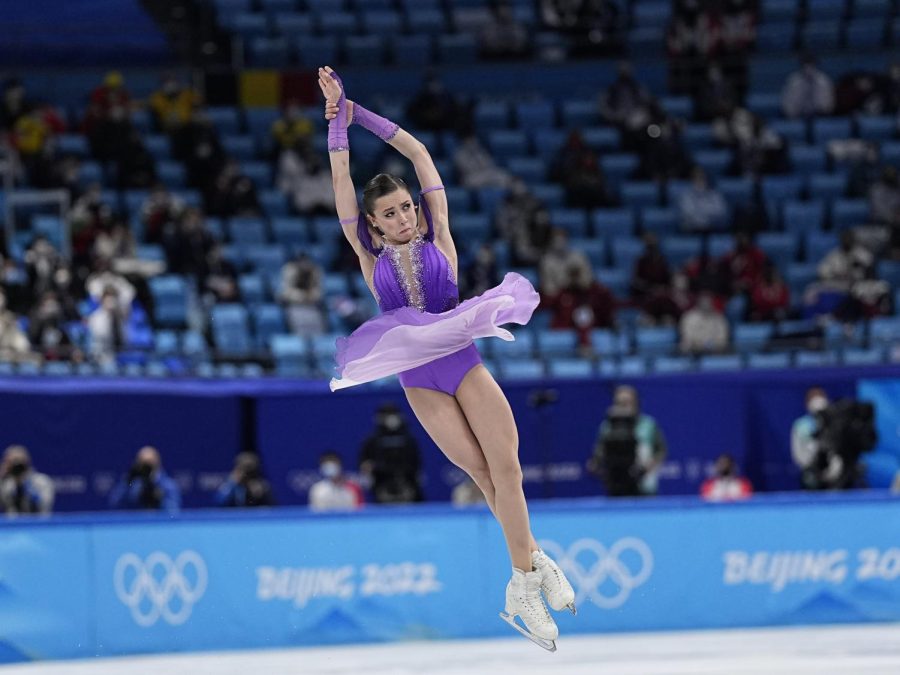February 2022. Beijing, China. The highly anticipated winter Olympics were in full swing, with athletes from all around the world gathering to compete in their respective sports. The excitement in the air was palpable as pressures mounted and the competitions began.
Following a stunning opening ceremony, the men and women’s figure skating tournament, which has always been one of the most viewed sports in the winter Olympics, started with a bang. In the women’s section of the competition, it was clear that the Russians had the upper hand, with three of their female athletes, all coached by Eteri Tutberidze, being favored to win gold, silver, and bronze.
However, one of the Russian girls stood above the rest: 15-year-old Kamila Valieva. The other two, Anna Shcherbakova and Alexandra Trusova, showed remarkable skill as well, but Kamila was something else. She wowed the judges with her practically perfect execution of challenging jumps and superior technical ability. It seemed like she was on track to win gold until it all came crashing down right before the individual free skate.
“In the lead up to the Olympics, I think we were all watching the Russian skaters with a degree of awe because they were completing these quads that no other women in the world were completing,” said Jessica Fisher, humanities department chair. “And she [Valieva] tested positive for a controlled substance that happens to be something that, in addition to doing other stuff, also delays puberty for women.”
In a test that was administered on December 25th, 2021, Valieva had tested positive for a drug called trimetazidine, which is known to serve as a heart medication. The drug is listed by the World Anti-Doping Agency (WADA) as a banned substance in athletic competition because it increases blood flow to the heart, which is under significant stress during intense practice of sports. Usage of this drug could provide athletes with more energy, giving them an unfair advantage against their fellow competitors.
After the results of Valieva’s drug test were reported, the Russian Olympic Committee met to decide how to proceed. Since Valieva is a minor, they decided to allow her to compete and cancel the award ceremony if she placed on the podium. Unfortunately, during her free skate, Valieva faltered and for the first time in many years, she fell in the middle of a jump. Her score plummeted, and Anna Scherbakova managed to win gold, followed by Trusova winning silver, and Japanese skater Kaori Sakamoto winning bronze.
“For me, it invalidated the legitimacy of the competition,” Ms. Fisher said. “This poor girl is 15 years old, so she is technically not consenting to the drugs that are being given to her by the Russian sports establishment and made it so that every other figure skater couldn’t really compete in a way that felt authentic.”
Valieva’s reaction was heartbreaking to watch as she burst into tears once her routine had finished. It was clear the immense scrutiny had gotten to her, and she could not handle the immense pressure that had been placed on her shoulders. Trusova also broke down when she saw that Shcherbakova had beaten her to the gold, screaming that she was “done with the sport” while Shcherbakova was completely alone as the announcer declared her the victor.
The entire night turned into chaos and exposed a major underlying problem in the sport of figure skating, especially in regard to Olympic competition. Girls as young as 13 are being put through grueling training that impacts both their mental and physical health. Since they have not gone through puberty, their bones are more resistant to breakage and their bodies are smaller, which allows them to do quadruple jumps, one of the most difficult to accomplish. Their coaches have little regard for what happens to them, so long as they continue winning.
“I’ve found that if a particular student displays promise and shows that they’re hardworking, diligent, and willing to put their time into skating, a coach will immediately latch onto them,” said Josephine Burdekin (‘22), who has been skating for about 12 years and has competed in ISI and USFS competitions. “And from there, the coaches push them to their breaking point, trying to get them to be the best skater they can be because they want to have the best skater. They grab onto this and force them into hours of on the ice training, off the ice training, weight training, and so on.”
In the last decade, Tutberidze, the coach of all three Russian skaters, has built a reputation for her ruthless training and strict rules that her athletes must follow. Many other skaters that have been coached by Tutberidze have “retired” from figure skating before they even reached 18 because they could not continue to operate under her harsh teaching methods that relied on their youth to perform jumps instead of valuing the artistry of the sport.
“Eteri’s training techniques exploit the bodies of young female skaters to the greatest possible extent so that her young female skaters can do many difficult jumps like the quad lutz that even most of the fully grown male skaters can’t execute,” Joy Li (‘24) said. “But her training system completely depends on the lightweight, short height, and flat body lines before the skaters’ bodies grow, which means that everything she teaches her students would fail as soon as they start to grow up.”
That’s why among figure skating fans, we jokingly say that 17-years-old is the ‘Eteri expiration date’. When Eteri’s skaters’ bodies are no longer fit for her training system, she gives them up and turns to younger, fresher skaters. Basically, she abandons those skaters who can not win for her anymore.”
After the world witnessed how distressed all three Russian competitors were following their routines, it was clear that something needed to change.
“I don’t blame Kamila Valieva,” Josephine said. “I blame her coach and the adults in her life for doing that to her. I think that she had such little control over the situation. At such a young age you can’t really put her at fault.”
In response to these recent events, many experts in the sport began to suggest that raising the age limit to 16, or even 18, would help protect young girls from being exploited by their coaches and parents. In addition, this new regulation could bring back artistry to the sport, placing a greater emphasis on the beauty of the routine instead of the difficulty of the jumps.
The International Skating Union will convene at the beginning of June to vote on whether they should raise the minimum skating age to 17. The proposition will require a two-thirds majority to pass, and if it does, it could potentially change the sport of women’s figure skating as we know it.
What’s important to remember in the aftermath of the Olympic scandal is that these young skaters deserve to have their health and safety protected by sports federations. This way, figure skating can remain the beautiful, entertaining sport that it is.
This theme of sacrificing the health of athletes can be seen in many sports other than figure skating, which is why it is vital that we use this moment to reassess how athletes are treated in Olympic competition.







![Student loan borrowers rally near the White House for Joe Biden to cancel all student loans. Biden, pictured left, is troubled with diminishing popularity with youth as he fails to forgive all students loans as he had promised. “[Biden] kind of fumbled things even though he tried with student loan forgiveness,” said Cory Warren, humanities department faculty. “That was [the] number one campaign promise to get the youth vote.” Whether it is student loans, age, or foreign policy, what, ultimately, drives away the youth vote for Biden?](https://webbcanyonchronicle.com/wp-content/uploads/2024/03/Duan-biden-popularity-1200x675.jpeg)









Jenny Wang | Apr 17, 2022 at 4:51 PM
Such an informative and thoroughly researched article! I love that you included quotes from so many people in the Webb community, each bringing a unique perspective on this issue. I know that my friend Joy had a lot to say about this and she was glad to have been interviewed 😀